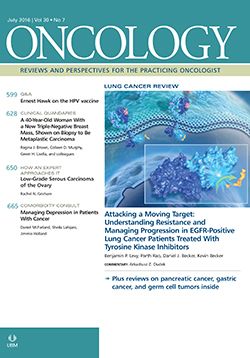Managing Depression in Patients With Cancer
The diagnosis and treatment of depression in the cancer setting can improve patients’ quality of life, their adherence to therapy recommendations, and the illness experience, all of which may affect survival outcomes.
Oncology (Williston Park). 30(7):665–671.

Table 1. Criteria for Major Depressive Episode (S-I-G-E-C-A-P-S)
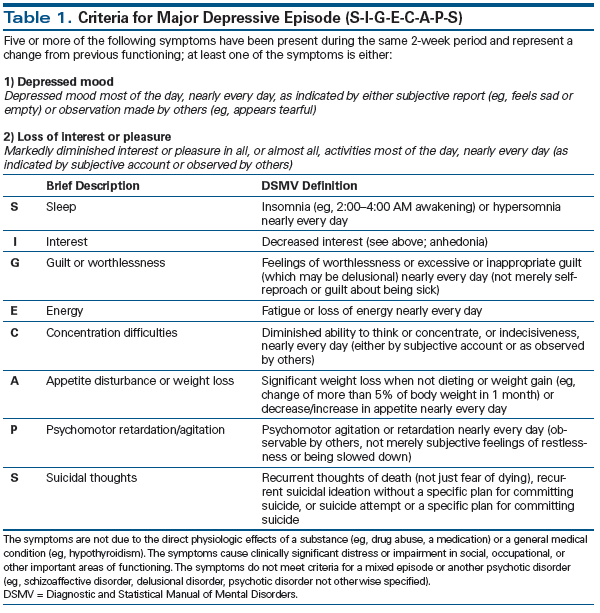
Table 2. Under-Recognition of Depression in Cancer Setting
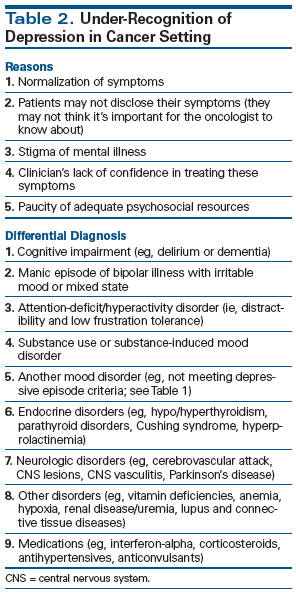
Table 3. Diagnostic Tools to Assess for the Etiology of Depressive Symptoms
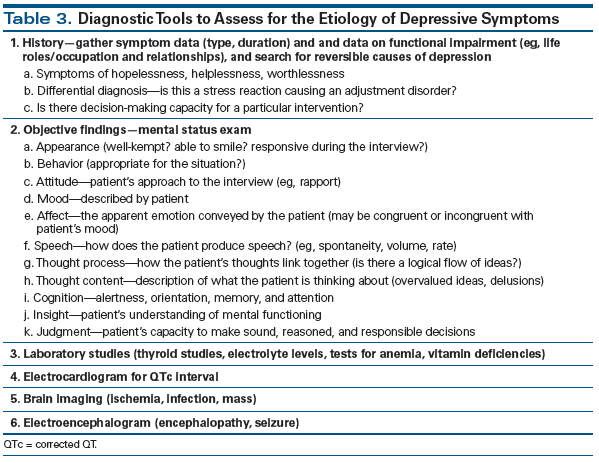
Table 4. Chemotherapeutic and Other Pharmacologic Agents Associated With Depression
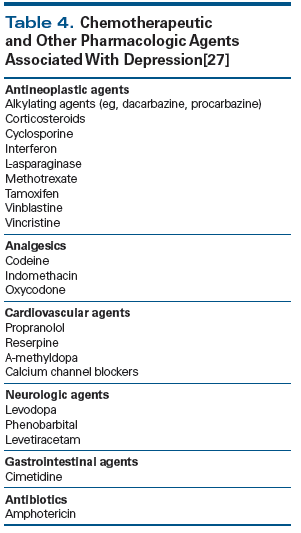
Table 5. Guide to Select Medications for Treating Depressive Symptoms
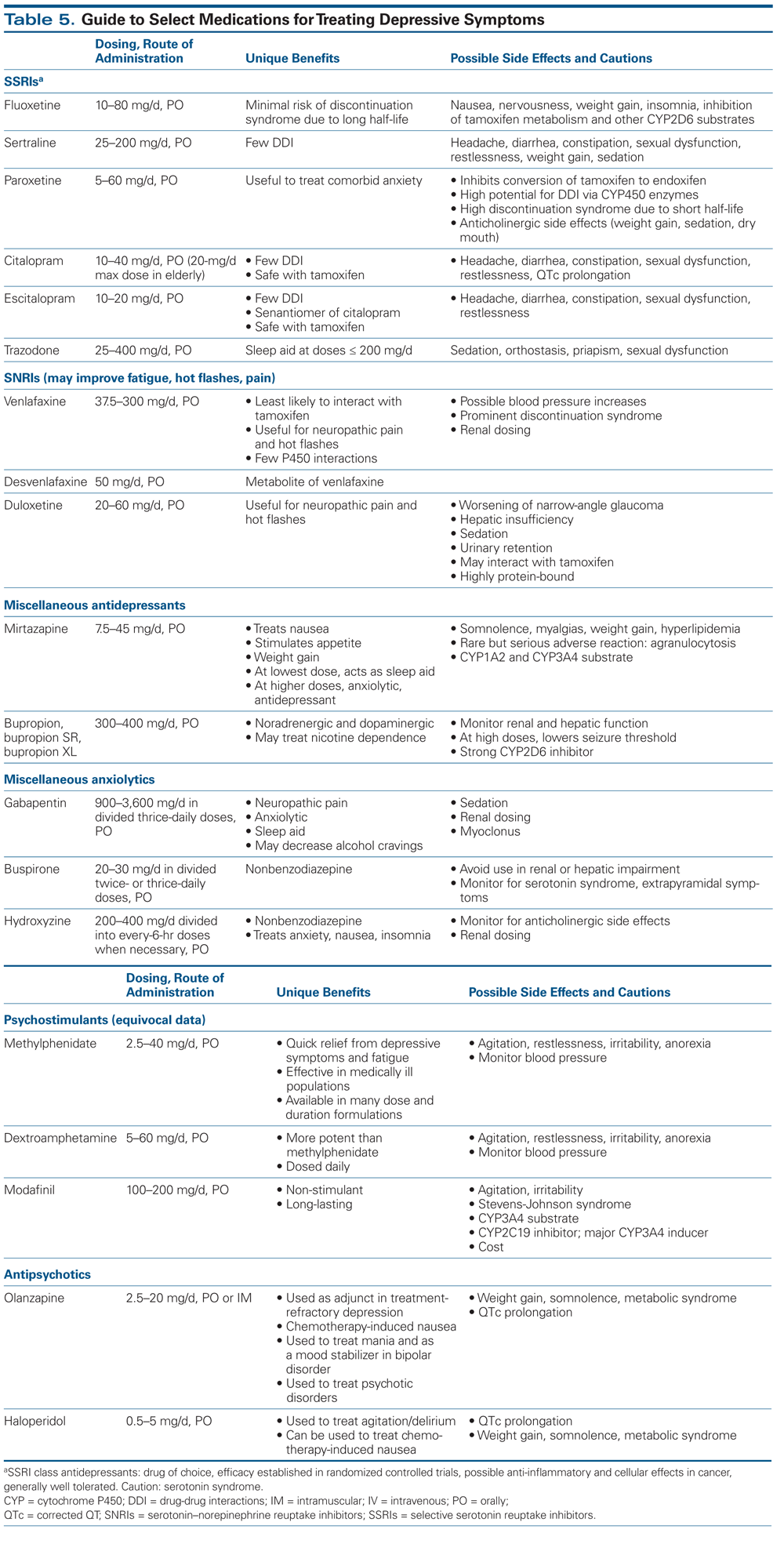
Introduction
The diagnosis and treatment of depression in the cancer setting can improve patients’ quality of life, their adherence to therapy recommendations, and the illness experience, all of which may affect survival outcomes.[1,2] In the past, the attitude toward the management of depression in patients with cancer originated from the idea that all cancer patients suffered from depression of some form, for which little could be done. There are now many effective treatments for depression in cancer patients; an oncologist can diagnose depression and initiate its treatment as a means to alleviate substantial suffering, contribute to better health outcomes, and provide comprehensive patient-centered care.
Clinical Vignette, Part 1
A 47-year-old mother of two is diagnosed with locally advanced, estrogen and progesterone receptor–positive, human epidermal growth factor receptor 2 (HER2)-negative breast cancer, and undergoes breast-conserving lumpectomy. She is a candidate for adjuvant chemotherapy because of her positive nodal status. At diagnosis she reports coping well and scores under 4 on the Distress Thermometer and Problem List (DT&PL).[3] During a routine chemotherapy infusion, a nurse-administered distress screen reveals a DT&PL score of 9 (range, 0–10), and the patient reports an increased feeling of “going through the motions” as if in a trance-like state, episodes of sudden tearfulness, and feeling like she is “out of control.” Concerned for her patient, the oncologist remembers a helpful mnemonic device from medical school for the diagnosis of depression-S-I-G-E-C-A-P-S (Sleep, Interest, Guilt, Energy, Concentration, Appetite, Psychomotor, Suicidal; Table 1)-and asks two additional screening questions from the Patient Health Questionnaire-2 (PHQ-2)[4]: 1) During the past 2 weeks, have you often been bothered by feeling down, depressed, or hopeless? and 2) During the past 2 weeks, have you often been bothered by little interest or pleasure in doing things? The oncologist knows that even simply asking, “Are you depressed?” can be used as a screening tool.[5]
To determine the patient’s functional status with newly diagnosed cancer, the oncologist asks if the patient has been struggling with her responsibilities or finding it difficult to complete necessary tasks. The patient reports feeling depressed but still looks forward to her children’s school events (“future-oriented thinking”) and reports that she enjoys her friends’ company (ie, she is not anhedonic). She has a good support system and help from her husband. During the interview, the patient reports feeling safe, denies any self-harm or self-injurious thoughts, denies use of illicit substances and alcohol, and denies having any access to firearms. The oncologist discusses an initial treatment plan with her that includes individual counseling and meeting other women with breast cancer in a support group. Medications are discussed as additional options to treat her symptoms and to optimize her health.
Discussion of Clinical Vignette, Part 1
Distress screening should be implemented at the time of diagnosis, at recurrence of disease, and routinely every 6 months, or whenever clinically indicated.[6] This approach is an important first step in providing basic psychosocial care in oncology. Although many oncology practices report that they address psychosocial needs (most frequently by asking their patients if they are depressed),[7] depression is often underdiagnosed or mistaken for another disorder (Table 2).[8,9] Screening for depression and understanding depressive symptoms provide opportunities for the oncologist to build empathic trust with the patient.[10] The next step after distress screening is a comprehensive clinical interview to further evaluate the nature of the depressive symptoms. Diagnostic tests should be ordered to rule out other depression mimickers (Table 3), and the assessment should focus on the patient’s symptom burden (eg, does he/she meet Diagnostic and Statistical Manual of Mental Disorders [DSMV] criteria for depression? [Table 1]), functional status (eg, are his/her relationships, self-care, or roles impaired?), and the presence of any dangerous behaviors (eg, excessive drug/alcohol use, medication abuse, access to firearms, physical or sexual abuse). Additionally, there are several anticancer medications that have been associated with depressive signs and symptoms, and it is important for oncologists to know about these drugs (Table 4).
In two-thirds of cancer patients who experience depression, the distress may be related to cancer treatments or symptoms, may be situational, or may be addressed with problem-solving.[11] However, the combination of symptoms and functional impairment typically warrants psychiatric treatment with therapy and/or medications. The vignette depicts situational depressive symptoms with minimal functional impairment and good prognostic risk factors (ie, support system). Options for effective treatment for cancer patients with depression include individual counseling, group support, cognitive behavioral or interpersonal therapy, and/or pastoral counseling.[12,13] Medications should be recommended for more severe symptoms.[14] The oncologist can emphasize the benefits of psychiatric care as a means to better health. Reframing negative cognitions (ie, correcting erroneous thoughts) and supporting the “ego” function (eg, focusing on what they are doing well) are effective interventions that provide emotional support. Patients highly value their relationships with their oncologic providers, and positive support and encouragement are also meaningful
interventions.
Clinical Vignette, Part 2
The patient’s coping ability improves with the aforementioned interventions. She completes her adjuvant therapies and does well on her antihormonal therapy. However, she has a recurrence of disease after 8 years. At this time, she becomes despondent and is struggling to complete daily activities. She reports sleeping poorly and lack of appetite, and no longer enjoys spending time with her friends and family or pursuing her interests. She has preoccupations with death and has difficulty concentrating, but denies any suicidal ideation or death wishes. Reluctantly, she agrees to engage in individual therapy but does not want to discuss medication. Given her symptom burden and inability to satisfactorily complete tasks, the oncologist encourages her to consider a sleep aid and an antidepressant to treat her major depressive symptoms (ie, she has 5 of 9 S-I-G-E-C-A-P-S symptoms for over 2 weeks, and functional impairment; Table 1).
Discussion of Clinical Vignette, Part 2
Drawing upon a positive, trusting therapeutic alliance in the oncologist-patient relationship may be enormously helpful for patients. Mild to moderate distress or depressive symptoms, without significant functional impairment, may be addressed with short-term supportive, cognitive behavioral, or behavioral activation therapies. Many supportive-type therapies may be used, such as expressive-supportive group therapy, individual cognitive behavioral therapy, pastoral counseling or religious services, and/or meditative/mindfulness practices. Therapeutic approaches should be drawn from existing guidelines from the National Comprehensive Cancer Network (NCCN) and the American Society of Clinical Oncology (ASCO), in addition to patients’ preferences, to promote adherence.[6,15] The oncology team should commit to helping patients engage in appropriate therapies.[16]
As the “gatekeeper” to mental health services, it is also important for the oncology team to be aware of potential red flags in either safety or functional impairment, which occur in more severe depressive states (ie, those meeting DSMV criteria for a major depressive episode). Greater symptom burden with functional impairment was witnessed in the patient in the second part of the vignette. Although previous therapies should again be suggested, medications to start treating her depressive symptoms should also be encouraged. Antidepressant medications are typically chosen based on the following factors: 1) a patient’s previous experience with antidepressant medication (did it work and was it titrated appropriately?); 2) utilization of medication side effect profile (eg, sedating vs energizing, or causing somnolence, appetite stimulation, sexual side effects); 3) other depression or cancer-related side effects; 4) cost; and 5) adherence (Table 5).
Greater attention is being devoted to quality-of-life issues for patients with cancer, and adequate treatment of depression is crucial given high prevalence rates.[17] Depression treatment in the oncology clinic setting is a component of early or primary palliative care that is associated with improved patient outcomes.[18-20] Although there are challenges to accessing psycho-oncologic care, the collaborative and integrated care models are approaches for early diagnosis and treatment, wherein a psychiatric consultant serves as a liaison to oncologists.[21] Additionally, psychosocial care should be provided according to patients’ preferences (eg, patient-reported outcome measures) as much as possible.[17]
Specialized psychosocial care for cancer patients is not always accessible, highlighting the need for basic psychiatric care in the oncology clinic, as well as the need for collaboration with psycho-oncology consultants.[22,23] Leveraging the trust that patients place in their oncology care teams in order to recognize and begin treatments for depression is key to providing adequate depressive symptom relief on a large scale. Simply discussing the possibility of depression can itself be therapeutic for patients, reduce mental health stigma, and preclude depressive behaviors, such as isolation. The SMaRT Oncology-1, -2, and -3 collaborative trials provide an effective framework for primary depression care by oncology teams collaborating with mental health professionals.[24-26]
Summary
This vignette emphasizes the provision of initial treatment approaches according to ASCO and NCCN guidelines in the care of patients with depression within the oncology setting. It illustrates a step-wise approach to the care of patients with depression, based on symptom severity, functional impairment, and safety assessment. The differential diagnosis, along with medical and psychological evaluations of depression, is discussed. Distress and depression screening, and the diagnostic interview, are frequently considered therapeutic by patients. The prescribing of psychotropic medications should be approached as a dedicated therapeutic intervention, with attention to tolerability, drug-drug interactions, and signs of effectiveness from the patient and people who are close to the patient. Future research should continue to focus on integrated psycho-oncologic care to improve outcomes for patients and healthcare systems.
Financial Disclosure: The authors have no significant financial interest or other relationship with the manufacturers of any products or providers of any service mentioned in this article.
References:
1. Pinquart M, Duberstein PR. Depression and cancer mortality: a meta-analysis. Psychol Med. 2010;40:1797-810.
2. Satin JR, Linden W, Phillips MJ. Depression as a predictor of disease progression and mortality in cancer patients: a meta-analysis. Cancer. 2009;115:5349-61.
3. Diagnostic and statistical manual of mental disorders, 5th ed. Washington, DC: American Psychiatric Association; 2013.
4. Kroenke K, Spitzer RL, Williams JB. The Patient Health Questionnaire-2: validity of a two-item depression screener. Med Care. 2003;41:1284-92.
5. Chochinov HM, Wilson KG, Enns M, Lander S. “Are you depressed?” Screening for depression in the terminally ill. Am J Psychiatry. 1997;154:674-6.
6. Andersen BL, DeRubeis RJ, Berman BS, et al. Screening, assessment, and care of anxiety and depressive symptoms in adults with cancer: an American Society of Clinical Oncology guideline adaptation. J Clin Oncol. 2014;32:1605-19.
7. Muriel AC, Hwang VS, Kornblith A, et al. Management of psychosocial distress by oncologists. Psychiatr Serv. 2009;60:1132-4.
8. Fallowfield L, Ratcliffe D, Jenkins V, Saul J. Psychiatric morbidity and its recognition by doctors in patients with cancer. Br J Cancer. 2001;84:1011-5.
9. Walker J, Hansen CH, Martin P, et al. Prevalence, associations, and adequacy of treatment of major depression in patients with cancer: a cross-sectional analysis of routinely collected clinical data. Lancet Psychiatry. 2014;1:343-50.
10. Pollak KI, Arnold RM, Jeffreys AS, et al. Oncologist communication about emotion during visits with patients with advanced cancer. J Clin Oncol. 2007;25:5748-52.
11. Vodermaier A, Linden W, Siu C. Screening for emotional distress in cancer patients: a systematic review of assessment instruments. J Natl Cancer Inst. 2009;101:1464-88.
12. Newell SA, Sanson-Fisher RW, Savolainen NJ. Systematic review of psychological therapies for cancer patients: overview and recommendations for future research. J Natl Cancer Inst. 2002;94:558-84.
13. Antoni MH. Psychosocial intervention effects on adaptation, disease course and biobehavioral processes in cancer. Brain Behav Immun. 2013;30(suppl):S88-S98.
14. Li M, Fitzgerald P, Rodin G. Evidence-based treatment of depression in patients with cancer. J Clin Oncol. 2012;30:1187-96.
15. Holland JC, Bultz BD; National Comprehensive Cancer Network. The NCCN guideline for distress management: a case for making distress the sixth vital sign. J Natl Compr Canc Netw. 2007;5:3-7.
16. Wein S, Sulkes A, Stemmer S. The oncologist’s role in managing depression, anxiety, and demoralization with advanced cancer. Cancer J. 2010;16:493-9.
17. Fallowfield L, Jenkins V. Psychosocial/survivorship issues in breast cancer: are we doing better? J Natl Cancer Inst. 2015;107:335.
18. Gaertner J, Weingartner V, Wolf J, Voltz R. Early palliative care for patients with advanced cancer: how to make it work? Curr Opin Oncol. 2013;25:342-52.
19. Temel JS, Greer JA, Muzikansky A, et al. Early palliative care for patients with metastatic non-small-cell lung cancer. N Engl J Med. 2010;363:733-42.
20. Bakitas MA, Tosteson TD, Li Z, et al. Early versus delayed initiation of concurrent palliative oncology care: patient outcomes in the ENABLE III randomized controlled trial. J Clin Oncol. 2015;33:1438-45.
21. Smith TJ, Temin S, Alesi ER, et al. American Society of Clinical Oncology provisional clinical opinion: the integration of palliative care into standard oncology care. J Clin Oncol. 2012;30:880-7.
22. Malowney M, Keltz S, Fischer D, Boyd JW. Availability of outpatient care from psychiatrists: a simulated-patient study in three U.S. cities. Psychiatr Serv. 2015;66:94-6.
23. McFarland DC, Johnson Shen M, Harris K, et al. ReCAP: Would women with breast cancer prefer to receive an antidepressant for anxiety or depression from their oncologist? J Oncol Pract. 2016;12:172-4.
24. Sharpe M, Walker J, Holm Hansen C, et al. Integrated collaborative care for comorbid major depression in patients with cancer (SMaRT Oncology-2): a multicentre randomised controlled effectiveness trial. Lancet. 2014;384:1099-108.
25. Walker J, Hansen CH, Martin P, et al. Integrated collaborative care for major depression comorbid with a poor prognosis cancer (SMaRT Oncology-3): a multicentre randomised controlled trial in patients with lung cancer. Lancet Oncol. 2014;15:1168-76.
26. Strong V, Waters R, Hibberd C, et al. Management of depression for people with cancer (SMaRT oncology 1): a randomised trial. Lancet. 2008;372:40-8.
27. Cowles MK, Nemeroff C. Depression as a systemic illness. In: Blumenfield M, Strain JJ, editors. Psychosomatic medicine. Philadelphia: Lippincott Williams & Williams; 2006. p. 50.
Oncology Peer Review On-The-Go: Cancer-Related Fatigue Outcome Measures in Integrative Oncology
September 20th 2022Authors Dori Beeler, PhD; Shelley Wang, MD, MPH; and Viraj A. Master, MD, PhD, spoke with CancerNetwork® about a review article on cancer-related fatigue published in the journal ONCOLOGY®.
Late Hepatic Recurrence From Granulosa Cell Tumor: A Case Report
Granulosa cell tumors exhibit late recurrence and rare hepatic metastasis, emphasizing the need for lifelong surveillance in affected patients.
